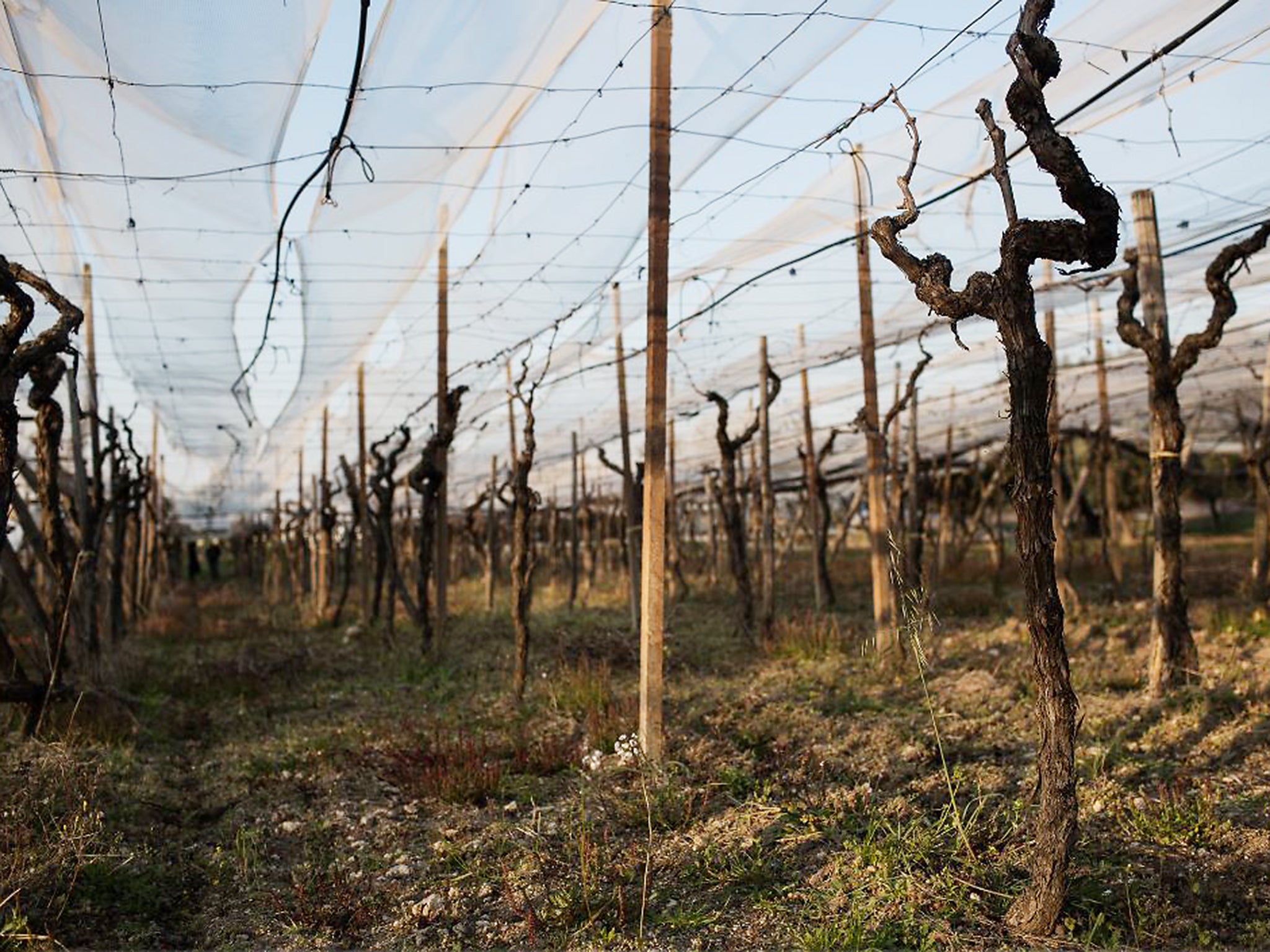Grapes, death and injustice in Italian vineyards
The Italian wine we enjoy here comes at a price. More than 40,000 women – favoured because of their smaller, nimble hands – toil in vineyards in conditions that have been described as ‘modern slavery’

Her husband can still recall how Paola Clemente used to set two alarms to make sure she woke in the middle of the night –1:50am – to catch the private bus that would take her and dozens of other women to the vineyards.
There, she would pick and sort table grapes up to 12 hours, taking home as little as €27 (£23), after middlemen skimmed her pay. Sometimes she was so exhausted, she fell asleep in the midst of conversation.
Her death of a heart attack at 49 in the fields has set off nearly two years of soul-searching in Italy over what authorities, labour experts and union organisers described as an elaborate system of modern-day slavery – involving more than 40,000 Italian women, as well as migrant and seasonal laborers – that remains at the core of Italy’s agricultural economy, especially here at the country’s jagged heel.
After months of investigation, this year authorities arrested six people, accusing them of using their recruiting and transportation agencies to extort wages from women so poor and desperate they dared not speak up and worked under extreme conditions.
Clemente’s death in July 2015 moved Italian legislators to pass a law last year aimed at combating exploitation of agricultural workers. But, experts say, their virtual enslavement remains disturbingly widespread for a country renowned for its products worldwide. By some measures, Italy is the second-worst state in the European Union for the enslavement of people, behind Poland.
“We are back to the situation we were in in the 1950s – the rights acquired by workers through the land reform have been crippled, if not nixed,” says Leonardo Palmisano, author of various books on agricultural workers and a native of Apulia. “This is a phenomenon that is pervasive everywhere, not only in Apulia, and it affects Italians as well as foreign workers.”
In Clemente’s case, farm owners regularly paid middlemen to pick up and transport her and the other women. Sometimes, the middlemen pocketed two-thirds of the women’s pay and deducted transportation costs. Five-hour trips were not counted on the clock.

If the women complained, the recruiter would threaten not to call them anymore. “Another woman can take your place,” one recalls being told, according to a court document.
Even now, no woman who worked through a recruiter would speak for attribution for fear of losing her job. Investigators faced the same challenge.
“When we started interviewing Ms. Clemente’s colleagues, we faced a wall of silence,” says Nicola Altiero, provincial commander in Bari for Italy’s financial police. “We see this system as exploitation, but workers see it as a chance, an opportunity that they dread losing.”
Indeed, in court records, several women declare that their recruiters are benefactors and that they considered themselves “fortunate” to have the work, as difficult as it was.
Today, Stefano Arcuri, 62, Clemente’s husband of 27 years, with whom she had three children, sometimes still sets the alarm for the same time she used to wake, or calls her mobile phone, when he misses her. “I want to feel that she is still alive,” he says.
Two months after Clemente died, the financial police searched her fellow workers’ homes and found calendars on which many of them marked the days they had worked over past years. The number of days far exceeded what was listed on company contracts.
It is a measure of Italy’s lingering economic crisis and scarcity of work that the women accepted almost any working conditions and would not go to authorities even as middlemen siphoned off their hard-earned pay.
Moreover, mafia organisations take part in the workers’ exploitation, feeding what Palmisano, the author, defines as a “system of slaves that impoverishes small farmers, enriches the large retailers and favours money laundering”.
Italy’s new law has raised jail sentences for exploiting workers to up to six years, and it imposes harsh sanctions against employers who use underpaid labour. Goods and even companies can be seized by authorities, with the proceeds going to a fund used to benefit the victims.
But many farmers say the law’s strict new requirements in terms of health checks and equipment are a serious burden for small companies, favouring large producers.
“I am very glad we have a law against the exploitation of workers in the fields, because these practices damage healthy companies, creating unfair competition,” says Donato Fanelli, sales manager at a small agricultural co-op in Rutigliano, near Bari. But “larger producers with seasonal workers can offer better prices,” he adds. “The new law should also help the hundreds of small and medium producers.”
Authorities praised the legislation as a first step. But a scarcity of work is driving a race to the bottom, union organisers warn. “The problem is that enslaved workers don’t take advantage of the gains,” says Assunta Urselli, general secretary at the Flai Cgil union in Taranto. “The only thing that increases is competition among workers.”
The constant threat of being replaced compelled Clemente and her co-workers to push themselves mercilessly. Women later told the police that, despite the summer heat, they even tried to drink water only if strictly necessary, to avoid asking permission to relieve themselves.
Women are preferred because their thin fingers and skill made them perfect for picking and cleaning table grapes. They do it for hours and hours.

One day, buyers from northern Europe came to visit the fields and were impressed with Clemente’s ability to remove the tiniest grapes from the rest of the cluster, without leaving marks, Clemente once told her family. “It’s my job,” she told them with pride, Arcuri recalls.
Before she died in mid-July 2015, Clemente was showing signs of malaise on the bus, her fellow workers told the police. She worked anyway – if anyone missed a day, the bosses would no longer call them.
Every workday, she woke in the middle of the night to wash up and prepare a backpack with crackers and a thermos bottle of coffee. “She was afraid of being late,” Arcuri says, looking out over a vineyard, covered with nets to protect against hail, near their home in San Giorgio Ionico, a town east of Taranto in western Apulia. “If you are late, they don’t let you get on the bus.”
Clemente worried so much about not working that if she did not get a call, she arose anyway and had her husband drive her to pickup points to see whether the group really did not have work that day, he said.
The private bus usually came around 3am. More than two hours later, as the sun rose, she and the other workers were ready to start sorting or picking table grapes. After the day was over, the bus drove them home again, over miles of poor roads. Sometimes, Clemente’s co-workers would tease her because she fell asleep while they were talking to her.
Clemente collapsed and her heart stopped beating about 8am,as she was sorting grapes under a plastic tent in a field.
Arcuri went to Rome last month to attend a ceremony dedicating a hall to his wife inside Italy’s Agriculture Ministry. Conditions are even worse for foreign migrants, he notes He cites a Bible passage saying that no one should exploit anyone else’s work, regardless of their origin.
“The difference between how my wife worked and how migrants work is that Italians make more money, and the fact that we have a house to sleep in,” Arcuri says.
“I trust justice. The truth will come out,” he says. “And I do hope that the law that her death triggered will help migrants and Italians alike.”
© New York Times
Join our commenting forum
Join thought-provoking conversations, follow other Independent readers and see their replies
Comments
Bookmark popover
Removed from bookmarks